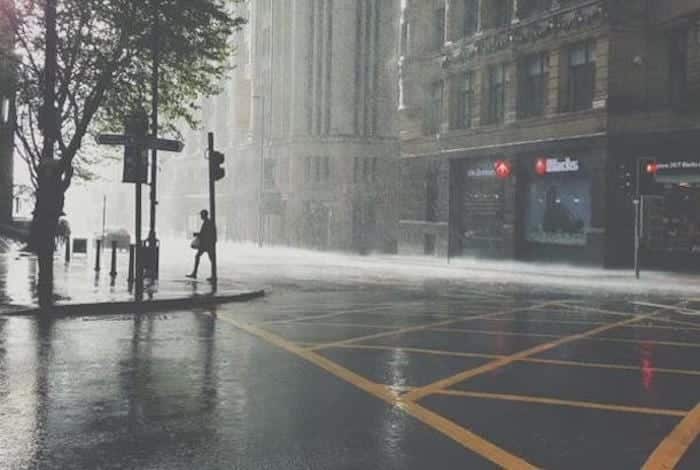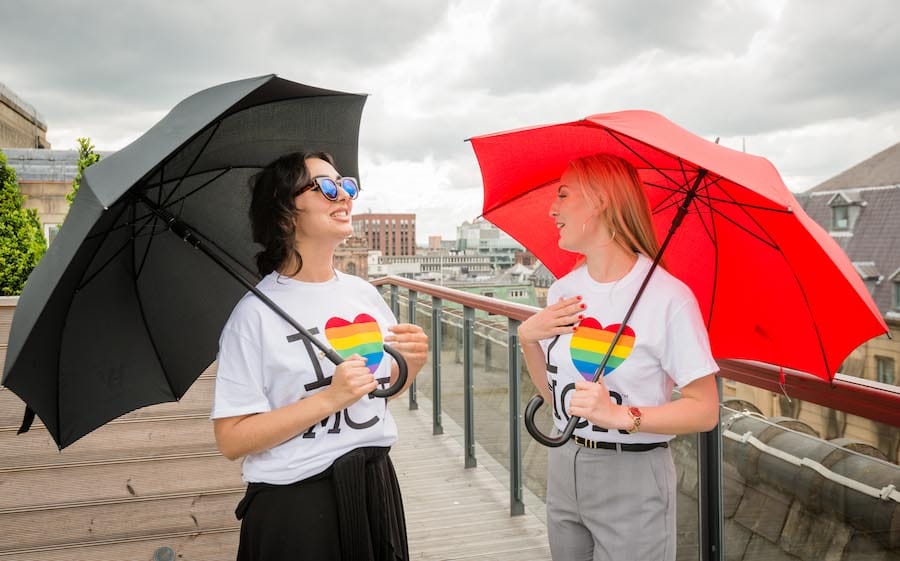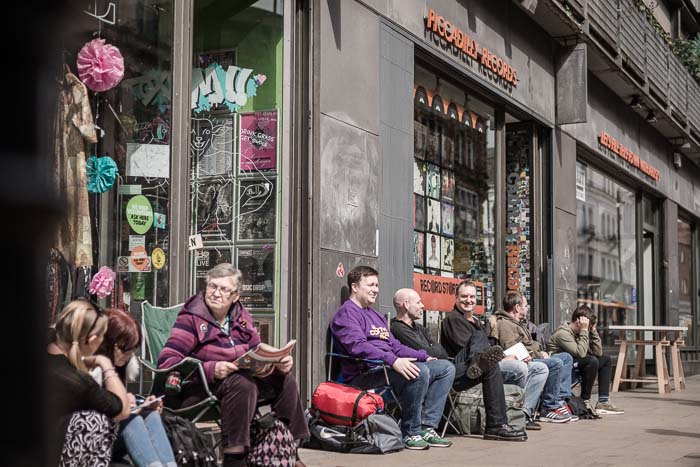The astounding myth: Rainy City? Does it really always rain in Manchester?
- Written by Stephen Lewis
- Last updated 2 years ago
- Cornerstone, Culture

According to Oscar Wilde, conversation about the weather is the last refuge of the unimaginative. Mancunians disagree…
The mercurial nature of the Manchester weather isn’t just an icebreaker. It’s a mood, a memory, an atmosphere, an emotion. In this age of globalisation, when every high street is more or less the same, it’s the weather that makes the place we come from and makes us who we are.
The perception of ‘rainy Manchester’ goes against weather statistics, which show Manchester having below the UK average rainfall. In fact, just this January, the Met Office showed that far from being the UK’s rainiest city, our city is one of the driest.
Incidentally, if you’re ever lost in the city and need directions, don’t ask anyone with an umbrella (or the orange girls with Primark bags – they’re Scousers). Seek out those resembling a drowned rat. Proper Manc! They’ll know their way around.
It has long been a standing joke that it always rains in Manchester.
Why is Manchester known as the Rainy City?

If you Google rainy city you will see that only one link on the first page (for Seattle) troubles Manchester’s supremacy as the rainy city. Yet Manchester in meteorological statistical terms is far from that – it averages about 810mm of rain per year and only rains 140.4 days of the year.
Compare these figures with the likes of Cardiff averaging 146.0 the UK averaging 154.4 and Cherrapunji, India averaging 170.4 days of rainfall per year and you will see that Manchester’s reputation as the rainy city is surely a cultural myth. It’s always been below the UK average.
The relentless drizzle of our beloved city has inspired many, from Thomas de Quincey – who described his mental landscape as a terrifying cloud structure bubbling up beyond control – to L.S Lowry, whose unforgivably bleak, grey and unchanging skies were the backdrop to so many of his paintings.
Morrissey’s lyrics frequently refer to rain, from William (“The rain falls down on this humdrum town”) to Well I Wonder, which ends with the sound of falling rain. And, of course, in The Queen is Dead (‘the rain that flattens my hair’), Morrissey refers to the problem of living in Manchester and having a bouffant hairdo.
Is Manchester the wettest city in the UK?
On the other hand, it’s the climate that has made Manchester what it is. The humidity means cotton is less likely to snap, which turned Manchester into Cottonopolis, a powerhouse of the Industrial Revolution. There would be no decaying mills and silent chimneys to haunt the mindscapes of our city’s writers and artists. Some say the damp air is responsible for our nasal accent.
Sitting on the edge of the Pennines, we get more than our fair share of rain and are forever destined to be known as the place to come to make a fortune selling umbrellas. But is it all a myth? Does Manchester really deserve to be called the ‘rainy city’? Did Robert Lewandowski’s agent get it wrong when he dismissed speculation about a possible move to Manchester on the grounds that “It always rains there.”
Does it actually always rain in Manchester?

That beacon of climatic common sense – The Met Office – defines a ‘rain day’ as one on which one millimetre or more of rainfall is measured. Manchester has on average 86.7cms of rain every year, compared to Britain’s wettest cities, Cardiff (115cms); Glasgow (112cms); Preston (103.36). It even rains more in Blackpool (88.27cms). In fact, Manchester barely makes the top ten. We do, however, have more rainy days than most – 150 of them a year (Glasgow still beats us with 170, as does Preston with its commendable 153). So it’s a case of little and often, just like the latest Co-op TV advert.
Where does the Manchester rain myth come from?
So where does the myth come from? Perhaps a document dating back to 1926 can provide the answer.
Discovered by researchers a few years ago, the 90-year-old record contains a map showing that some parts of what is now Greater Manchester experienced 139cms of rain a year in 1926 when the average rainfall in England was 91cms.
The map was shaded blue to denote annual rainfall. It was printed widely in the press, including the Manchester Guardian, and experts believe it was instrumental in reinforcing the city’s reputation for dismal weather – and once something sticks it’s difficult to shake off. But then, myths are more potent than history and if it’s a choice between the two, always go for the myth.

Whilst rummaging through old weather magazines as part of our research we came across an article printed in Weather in 1947 titled, ‘The Manchester Myth.” In this article the author attempts to trace the myth to its source.
The earliest reference to Manchester’s pluvial excess found is this 1898 article by, the then Director of the Meteorological Office, Robert H.Scott. Astoundingly in this 19th century article Scott is trying to disprove “absurd statements” that in Manchester hardly a day passes without rain. Rather interestingly Scott refers to a European treatise of 1881 which states that since Manchester’s industrialisation the number of rainy days has increased considerably.
In debating the article a commentator states that in Manchester:
The sun is almost always obscured by smoke haze, and the smoke particles fall back to earth laden with moisture that has condensed on them, thus making the air always feel damp, the streets always grimy, and giving all the sensations of a wet day.
As yet I’ve been unable to trace the original 1881 reference, but it seems more than feasible that perhaps, just perhaps, Manchester’s national (and now international) reputation as the Rainy City grew early in the mists of the industrial revolution when thick, damp-laden smogs lay over its mills and residents for the majority of the year.
Whilst this might get us closer to establishing why the myth arose it doesn’t help us in understanding why it still persists today. We like to believe its because the answer to the 1947 article’s question:
Do Mancunians encourage the fiction that their city suffers from a peculiarly wet climate?
Is an astounding, 100%, yes!
Is Manchester getting wetter?
Others disagree and point out that Manchester has actually been getting wetter over the past 100 years – even going so far as to suggest that Tuesdays are the wettest, Saturdays are getting wetter, and Wednesdays, Thursdays and Fridays are the driest.
And besides, if you count any form of precipitation like drizzle, sprinkles, mizzles, dew, light showers, intermittent spots, mists, sprays, breezes, splashes, puffs, scuds and even a squelchy ground – it is ‘technically’ raining in Manchester quite a lot, even if you don’t necessarily get soaked.
So, there you go. Rain – the tippling, the pelting, and the plothering, luttering from clouds the colour of cigarette ash. It has inspired us and amused us, dampened our hair but never our spirit. It’s played havoc with our clothes and our hairstyles, spoilt our weekends, and muddied our floors but it has also helped create our textile industry and, most importantly, made us who we are.
Whether we are the ‘rainy city’ or just the ‘fairly rainy city’, the rain deserves a place in all Mancunian hearts. So, you see, Mr. Wilde was wrong after all.
- This article was last updated 2 years ago.
- It was first published on 6 August 2014 and is subject to be updated from time to time. Please refresh or return to see the latest version.
Did we miss something? Let us know: press@ilovemanchester.com
Want to be the first to receive all the latest news stories, what’s on and events from the heart of Manchester? Sign up here.
Manchester is a successful city, but many people suffer. I Love Manchester helps raise awareness and funds to help improve the lives and prospects of people across Greater Manchester – and we can’t do it without your help. So please support us with what you can so we can continue to spread the love. Thank you in advance!
An email you’ll love. Subscribe to our newsletter to get the latest news stories delivered direct to your inbox.
Got a story worth sharing?
What’s the story? We are all ears when it comes to positive news and inspiring stories. You can send story ideas to press@ilovemanchester.com
While we can’t guarantee to publish everything, we will always consider any enquiry or idea that promotes:
- Independent new openings
- Human interest
- Not-for-profit organisations
- Community Interest Companies (CiCs) and projects
- Charities and charitable initiatives
- Affordability and offers saving people over 20%
For anything else, don’t hesitate to get in touch with us about advertorials (from £350+VAT) and advertising opportunities: advertise@ilovemanchester.com



Review: Kim’s Convenience at HOME is ‘a moving portrait of immigrant sacrifice and success’

“Manchester is not Britain’s second city, it’s the first” – Jeremy Clarkson
















